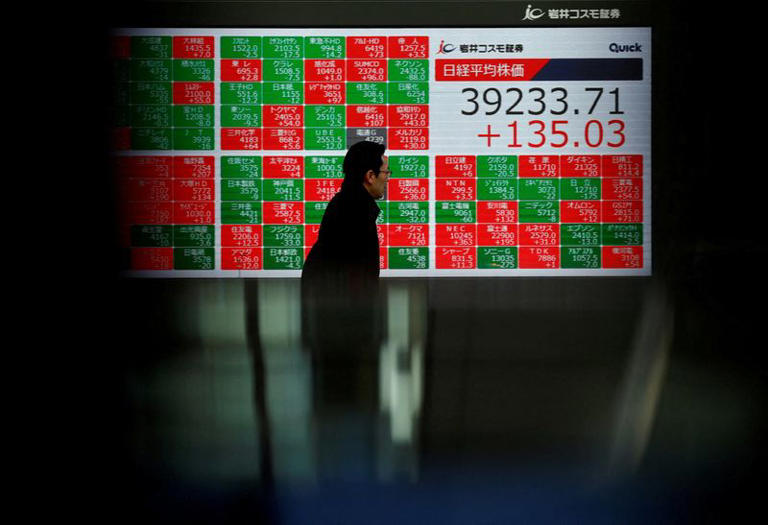Asian share markets strengthened on Monday, with the Nikkei hitting another record high, as investors prepared for a week filled with central bank events and significant data releases that will help shape expectations regarding future interest rate movements.
Federal Reserve Chair Jerome Powell’s testimony before lawmakers on Wednesday and Thursday will be closely watched, although analysts anticipate that he will maintain a cautious approach to monetary policy in light of recent inflationary surprises.
The upcoming February payrolls report on Friday could also influence market sentiment, with forecasts pointing to a continued solid increase in employment following January’s substantial rise of 353,000 jobs.
The European Central Bank (ECB) is expected to keep interest rates unchanged at 4.0% during its meeting on Thursday. However, the bank is anticipated to revise down its inflation outlook, signaling potential future rate cuts. Analysts suggest that the ECB’s stance will likely be dovish but cautious, indicating a readiness to lower rates, possibly starting with a 25 basis point reduction in June.
NatWest Markets analysts believe that a total of 100 basis points in rate cuts is appropriate for the ECB this year. While there may not be an immediate need for urgent action, the bank may opt for a gradual approach, possibly beginning with a 25 basis point cut before considering a larger reduction later in the year.
Similarly, the Bank of Canada is expected to maintain its current policy stance this week, with the first rate cut not expected until June or later.
President Joe Biden’s upcoming State of the Union address on Thursday, alongside the Super Tuesday U.S. primaries and China’s National People’s Congress (NPC) meeting starting on Tuesday, are among the key events to watch this week, potentially shaping market sentiment and policy expectations.
Chinese blue chips showed a slight decline of 0.2% as investors awaited concrete news regarding any potential stimulus measures from the NPC meeting.
Meanwhile, MSCI’s broadest index of Asia-Pacific shares outside Japan rose by 0.4%, rebounding after a slight drop last week that ended a five-week winning streak.
In Japan, the Nikkei climbed by 0.8%, surpassing the 40,000 mark for the first time in its history. This comes after five consecutive weeks of gains. Tokyo Electron, a tech favorite, has seen a remarkable 55% surge since the beginning of the year.
A positive report on fourth-quarter capital expenditure released on Monday suggested that Japan’s GDP could be revised upwards from negative to positive, indicating that the country may not have been in recession after all. This development has fueled speculation that a strong wage round could prompt the Bank of Japan to end its negative interest rate policy in April.
Japan’s government is reportedly considering declaring an end to deflation, as per the Kyodo news agency, which could signal a move towards policy tightening.
In European markets, EUROSTOXX 50 futures edged up by 0.2%, while FTSE futures dipped slightly by 0.1%.
S&P 500 futures and Nasdaq futures remained relatively unchanged, trading near record closing highs reached on Friday fueled by positive earnings reports and excitement surrounding advancements in artificial intelligence.
BofA analyst Savita Subramanian anticipates the S&P 500 index to continue its ascent to 5,400, driven by robust earnings. However, she notes a potential risk of a correction considering the market’s significant recent gains.
In currency markets, the dollar softened slightly due to some weaker-than-expected U.S. economic data, while the Japanese yen strengthened ahead of Tokyo’s upcoming consumer price data expected to show a rise in inflation for February.
The dollar was at 150.11 yen, down from its recent peak of 150.85, while the euro stabilized at $1.0842 after bouncing back from a low of $1.0796 last week.
Gold prices remained steady after reaching a two-month high, with the precious metal trading at $2,082 an ounce.
Oil prices saw gains following an agreement among OPEC+ members, led by Saudi Arabia and Russia, to extend voluntary oil output cuts of 2.2 million barrels per day into the second quarter.
Brent crude rose by 13 cents to $83.68 a barrel, while U.S. crude gained 2 cents to $79.99 per barrel.
